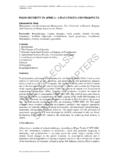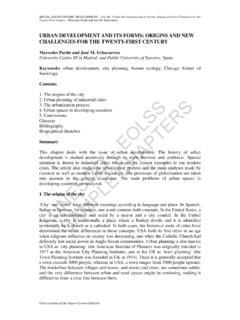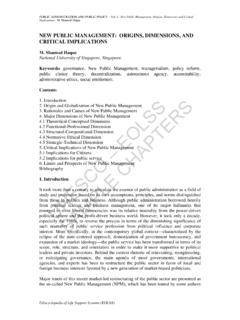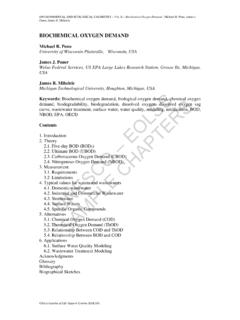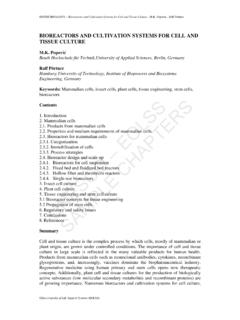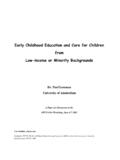Transcription of The Impact of Psychosocial Factors on Development
1 PSYCHOLOGY - Vol .II - The Impact of Psychosocial Factors on Development - Marilyn B. Benoit THE Impact OF Psychosocial Factors ON. Development . Marilyn B. Benoit Associate Clinical Professor, Department of Psychiatry, Georgetown University Medical School, Washington, , USA. Keywords: Biological psychiatry, shared environment, nonshared environment, protective factor, risk factor, internalized sense of poor self-worth, primary narcissistic needs, pathological narcissism, population-based Psychosocial interventions Contents 1.
2 Introduction S. TE S. 2. Environment and Genes 3. Psychosocial Risk and Protective Factors R. AP LS. 4. How Can We Promote Healthy Psychological Development ? Glossary Bibliography C EO. Biographical Sketch Summary E . Psychiatry has a long history of using a biopsychosocial framework for understanding H. the human condition. While much of the current focus within the discipline is on PL O. unraveling the biological elements of human behavior, emotion, and cognition, we must not lose sight of the importance of the Psychosocial variables that play a critical role in M SC.
3 Influencing psychological Development . The totality of the environment from the microenvironment of the womb, to the family environment, to the larger societal macroenvironment is involved in shaping Development . With this knowledge, it behooves us to do all that we possibly can to create the best possible opportunities to SA NE. enhance the Development of all children. It will take the presence of strong community- based leadership to build healthy neighborhoods within which families will have a better chance of raising mentally healthy children.
4 And governmental organizations U. must have the political will to provide their citizens with the basic Psychosocial supports that facilitate the formation of healthy families, and mediate healthy psychological Development for all. 1. Introduction The last two decades of the twentieth century focused on biological psychiatry, perhaps minimizing the role of Psychosocial Factors on psychological Development . The explosion of neuroscience and genetic research revealed much information about the biological underpinnings of psychiatric disorders, and led to the Development of biological interventions as a major part of psychiatric treatment.
5 However, the biological research has also revealed that the environment plays an important role in the expression of the inherited traits in a given person. Now, instead of continuing the old debate about nature versus nurture, we must understand how nature and nurture interact Encyclopedia of Life Support Systems (EOLSS). PSYCHOLOGY - Vol .II - The Impact of Psychosocial Factors on Development - Marilyn B. Benoit in Development . At best, we can state that with any biological predisposition, the environment of the home in which a child is raised, and the larger social environment outside of the home, all influence the Development of that child.
6 This article will identify critical Factors that influence Development and will provide some recommendations targeted towards populations rather than towards individuals. 2. Environment and Genes It is now accepted in the scientific community that our environment shapes the expression of our genes and that specific experiences of interactions with the environment affect the laying down of the neural circuitry of the developing brain. Cravioto and Arrieta address this issue in their discussion of malnutrition in childhood: Heredity and environment do not summate as additive combinations; rather, the quantitative effect of either one is dependent on and interacts with the contribution given by the other factor.
7 Accordingly, mental growth would be modified to the S. TE S. degree to which conditions of life associated with depressed social position function R. AP LS. directly to modify the growth and differentiation of the central nervous system and indirectly to affect the opportunity for obtaining, and the motives for profiting from, experience. C EO. In his brilliant article recommending a new framework for integrative psychiatry, Eric Kandel, an American psychiatric researcher and Nobel prize winner, discussed the critical role of the environment in influencing brain Development and summarized his conclusion as follows: This distinctive modification of brain architecture along with a E.
8 Unique genetic makeup, constitutes the biological basis for individuality. H. PL O. Kandel further discussed the concept of the transcriptional function of genes, which refers to the job genes have to produce proteins that direct the expression of the genes in M SC. the context of environment. Kandel concluded that this function is, in fact, highly regulated, and this regulation is responsive to environmental Factors . SA NE. Twin and adoption studies have provided sound scientific evidence to support the Impact of environment in Development .
9 Reiss and his colleagues have posited that it is the combination of genetic Factors , shared environment, and nonshared environments U. that influence psychological Development in siblings. The shared environment refers to the environmental Factors that were the same for all siblings ( socioeconomic and cultural Factors , the same parents, the same community, religion etc.). The nonshared environment refers to children's unique interactions with their parent(s), other siblings, other family members, authority figures, peers, etc.
10 Additionally, the nonshared environment includes children's own perceptions and interpretations of events in their environment (see Developmental Psychology: Main Problems and Modern Tendencies). The groupings that Reiss and his colleagues used for study and analysis were (i) monozygotic twins who share the same genetic pool, (ii) genetically unrelated step-siblings who shared the same environment, and (iii) twins raised apart who had the same genetic endowment, but not the same shared environment. The authors refer to the heritability/environment equation, and describe a developmental trajectory in which parents matter most during childhood: We have found that the Encyclopedia of Life Support Systems (EOLSS).
